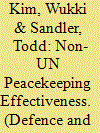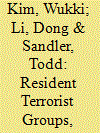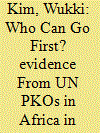|
|
|
Sort Order |
|
|
|
Items / Page
|
|
|
|
|
|
|
| Srl | Item |
| 1 |
ID:
190152


|
|
|
|
|
| Summary/Abstract |
This research note extends the Bara and Hultman (2020) study on the effectiveness of non-UN peacekeeping missions in terms of curbing one-sided violence (OSV) against civilians. In particular, we employ two novel instruments to address the two-way causality between the number of non-UN peacekeepers and OSV measures. For each panel year, our instruments involve the interaction between the sum of various designated peacekeepers contributed and the inverse distance between the capitals of contributor and conflict countries. As required, the instrument satisfies the necessary inclusion and exclusion (exogeneity) requirements. The instrument-based results establish a robust reduction in government OSV stemming from the number of non-UN peacekeepers deployed. That reduction also holds for propensity-score matching and the inclusion of UN peacekeepers in the same regression. Non-UN peacekeepers did not have a robust influence on rebel OSV.
|
|
|
|
|
|
|
|
|
|
|
|
|
|
|
|
| 2 |
ID:
177032


|
|
|
|
|
| Summary/Abstract |
This paper introduces transnational terrorist hostage event (TTHE) data set from 1978 to 2018. TTHE includes up to 50 variables for each of its 1,974 incidents, based on information in media sources. Four types of hostage incidents—kidnappings, barricade missions, skyjackings, and non-aerial hijackings—are recorded for a global sample. Select key variables include the number of hostages, targets of abductors’ demands, terrorist behavior in negotiations, amount of money ransom demands, other kinds of demands, duration of incident, and the outcome of negotiations. Our hostage data set also indicates location start and end, attack force size, victim numbers, casualties, weapons used, and logistical outcome. TTHE is tied to the International Terrorism: Attributes of Terrorist Events (ITERATE). We display interesting features of hostage incidents over time and an application of TTHE to identify the determinants of logistical and negotiation successes for hostage missions.
|
|
|
|
|
|
|
|
|
|
|
|
|
|
|
|
| 3 |
ID:
172142


|
|
|
|
|
| Summary/Abstract |
For 2011–2017, this paper revisits NATO burden sharing in light of recent developments and pledges to bolster members’ defense shares of GDP to 2%. Russian nationalism, enhanced transnational terrorism, and intrastate conflicts are apt to increase the publicness of NATO defense spending over the last eight years. When NATO allies’ defense shares of GDP are correlated with their GDP ranks, there is clear evidence of the exploitation of the large, rich allies by the small, poor allies, indicative of allies sharing purely public defense spending since 2011. Such exploitation and free riding has rarely been seen after 1967. In addition, there is an absence of concordance between NATO allies’ defense burdens and their derived benefit shares, consistent with greater defense publicness. Finally, we find further proof of exploitation and free riding for a broad-based measure of security spending.
|
|
|
|
|
|
|
|
|
|
|
|
|
|
|
|
| 4 |
ID:
185489


|
|
|
|
|
| Summary/Abstract |
This paper examines the effectiveness of non-UN-led peacekeeping operations (PKOs) from two alternative perspectives. First, the four kinds of regional and international (out of region) PKOs are investigated based on their ability to curtail one-sided violence (OSV) against civilians by host governments or rebels. That analysis is further bolstered by propensity-score matching to ameliorate potential selection bias stemming from non-UN PKOs. For the matched sample, we find that non-UN peacebuilding and peace enforcement missions limit rebel caused OSV, which is a novel result. Second, the ability of non-UN PKOs’ troops and police to end conflict or to maintain peace are ascertained based on survival analysis. Non-UN troops, but not police, curtail the transition from peace, regardless of matching. Generally, non-UN PKOs display effectiveness in limiting OSV or maintaining peace, but not in ending conflict.
|
|
|
|
|
|
|
|
|
|
|
|
|
|
|
|
| 5 |
ID:
177823


|
|
|
|
|
| Summary/Abstract |
This paper revisits moral hazard associated with military aid given to host countries to eliminate their resident terrorist groups. This conflict aid presents recipient countries with perverse incentives because the aid ends once resident groups are removed. In the case of US aid recipients, the longevity of resident terrorist groups rose dramatically. The current article improves on the empirics of the pioneering article by showing that the moral-hazard concerns extend to other major donors – the United Kingdom, France, and Germany. Additionally, military assistance given by a collective of countries to host countries greatly reduces the moral hazard but does not eliminate it. Moreover, policy alignment or affinity between a major donor and the host aid-recipient country does not generally augment resident terrorist groups’ survival, except marginally for the United States, when other sources of military aid are allowed. We introduce other empirical and conceptual innovations for analyzing military-aid-induced moral hazard.
|
|
|
|
|
|
|
|
|
|
|
|
|
|
|
|
| 6 |
ID:
177857


|
|
|
|
|
| Summary/Abstract |
The peacekeeping literature has primarily documented correlations between peacekeeping operations (PKOs) and their effectiveness or has focused on the decisions of troop-contributing countries participating in PKOs. Unlike the extant research, this paper shifts the focus to the decision-making process within PKOs. More specifically, this paper focuses on the timing of peacekeeper deployment by investigating how contributor leaders are distinguished from contributor followers. To tackle this topic, I use deployment-map data from 13 UN PKOs in Africa from 1990 to 2016. When a leader country deploys to a region before other countries, the followers will thus face an incentive to free ride because waiting to deploy to the region until it is secure is less risky. In short, there is a second-mover advantage that induces other countries to delay deployment until much later in a given UN PKO’s designated deployment window. This study finds that countries that could deploy more troops at their initial time of deployment and that have many previous UN PKO experiences are more likely to be leaders. Results also suggest that contributors engaging in multiple UN PKOs contemporaneously are less likely to be leaders.
|
|
|
|
|
|
|
|
|
|
|
|
|
|
|
|
|
|
|
|
|